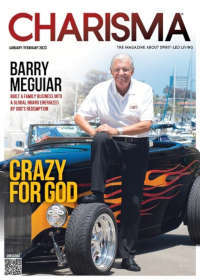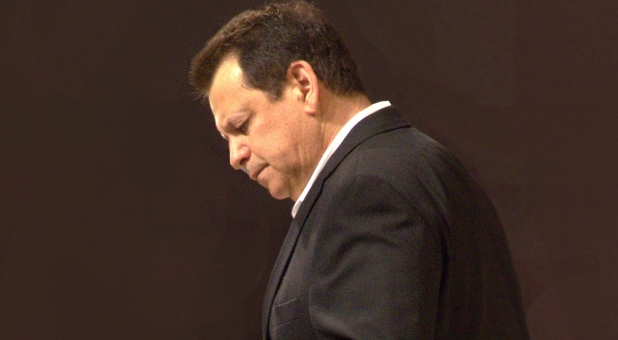Was Mario Murillo Correct to Rebuke Certain Contemporary ‘Prophets?’
Was Mario Murillo right to publicly rebuke certain contemporary “prophets? The answer is clear, not only from Scripture, but also from history.
In fact, there is an example from history with amazing parallels to this situation.
Peter Cartwright (1785-1872), for example, was a circuit-riding Methodist revivalist who saw great revival and thousands come to Christ during his many years of ministry. He also encountered and contended with a prophetic movement that based its beliefs and actions on visions, dreams, prophecies and supposed angelic visitations.
In his autobiography, Cartwright tells of members of this group attending his interdenominational camp meetings, and how, on at least one occasion, he publicly rebuked them for drawing attention to themselves with their supposed prophetic manifestations. He also tells of several meetings with their leader, Joseph Smith, whom he called “Joe Smith.”
Cartwright Meets “Joe” Smith
Cartwright says that “Joe Smith” shared with him his vision for the restoration of the church of the New Testament. According to Smith, during a time of revival in upper state New York he had prayed about which church was the right one. Smith said that during this time of prayer:
“I saw a pillar of light exactly over my head, above the brightness of the sun, which descended gradually until it fell upon me. When the light rested upon me I saw two personages, whose brightness and glory defy all description, standing above me in the air” (Hyatt, “Prophets and Prophecy,” 90).
According to Smith, the Father, Son and Holy Spirit appeared in this vision and told him not to join any of the churches, for none was the true church. Revealing his true prideful motives, Smith said to Cartwright, “If you will join me, we could sweep, not only the Methodist church, but all the churches, and you would be looked up to as one of the Lord’s greatest prophets” (Hyatt, “Prophets and Prophecy,” 94).
Smith Proves to be Angry and Unteachable
Unmoved by the flattery, Cartwright began questioning Smith about his doctrine and it soon became obvious that Smith had left behind biblical truth and was following sensational teachings based on prophecies, visions and supposed angelic visitations.
As Cartwright continued pointing out his error from Scripture, he said that Smith’s anger boiled over and “he cursed me in the name of his God.” Smith angrily retorted,
“I will show you, sir, that I will raise up a government in these United States which will overturn the present government, and I will raise up a new religion that will overturn every other form of religion in this country (Hyatt, “Prophets and Prophecy,” 92).
Visions and Angelic Visitations
Joseph Smith and his early followers based their beliefs almost solely on their subjective experiences with prophecies, visions and angels. On one occasion an angel named Moroni supposedly appeared to Smith and told him where to find the plates on which were inscribed the Book of Mormon, written in an ancient Egyptian text.
Smith claimed that while he and an associate, Oliver Cowdery, were translating the book, John the Baptist as well as Peter, James and John appeared to them and ordained them to the priesthood of Melchizedek.
How impressive! Demons will always play on human credulity and pride, telling one how important they will be if they accept this revelation.
In 1831, based on a supposed revelation from God, Smith and many of his followers migrated to Kirkland, Ohio. There they built, and in 1836, dedicated the first Mormon temple. According to one Mormon historian, there was a spiritual outpouring almost unmatched in ecclesiastical history. Smith himself wrote a detailed description, saying,
“A noise was heard like the sound of a rushing mighty wind, which filled the Temple, and all the congregation simultaneously arose, being moved upon by an invisible power; many began to speak in tongues and prophesy; others saw glorious visions; and I beheld the Temple filled with angels, which fact I declared to the congregation. The people of the neighborhood came running (hearing an unusual sound within, and seeing a bright light like a pillar of fire resting on the Temple), and were astonished at what was taking place. This continued until the meeting closed at 11p.m.” (Hyatt, “Prophets and Prophecy,” 92-93).
Those of the modern prophetic movement would likely have designated Joseph Smith as a “prophet” or “seer,” just as they have so many today. We should, however, recall the words of Jesus in Matthew 23:6-12 where He warned against adopting honorific titles that would set some above and separate from others. The reason was, you are all brethren and whoever exalts himself will be humbled and whoever humbles himself will be exalted (Matt. 23:8,12).
What We Can Learn from Mormonism
Out of this group that based its beliefs on prophecies, visions and angelic visitations, has grown a movement that today claims millions of followers around the world. While some of their beliefs are obviously Christian in origin, they also hold to many beliefs that have no basis in Scripture and are at odds with biblical Christianity.
For example, Mormons teach a form of polytheism, claiming that the planets of the universe are ruled by different gods and that Elohim—the God of the Old Testament—is the god of this planet. They also teach that Elohim had a wife who, as the Eternal Mother, bore his offspring. According to Mormon doctrine, Jesus is merely the oldest of the offspring produced by the Heavenly Father and Heavenly Mother, and we are all His spirit brothers and sisters (Hyatt, “Prophets and Prophecy,” 93).
Their strange doctrines came forth because they failed to “test the spirits” and “judge” the prophecies and visions in their midst as Scripture commands. Cartwright regarded the Mormons as a living example of Satan’s ability to transform himself into an “angel of light” (2 Cor. 11:13-14).
Winston Churchill once said, “Those who do not learn from history are doomed to repeat it.” Here are some suggestions that can help us avoid repeating the same mistakes as this movement:
1. Measure everything by the Word of God. Let the Bereans of Acts 17:11 be our guide. They were commended because, instead of naively accepting what Paul and Silas preached, they searched the Scriptures daily to find out whether those things were so. When strange prophecies and unusual manifestations began to appear in the early Methodist revival, John Wesley exhorted the people, “Try all things by the written word and let all bow down before it. You’re in danger of enthusiasm every hour, if you depart ever so little from the Scripture: yea; from that plain, literal meaning of any text, taken with the context” (Hyatt, “Prophets and Prophecy,” 45).
2. Keep Christ front and central. Many prophetic movements have gone awry because of losing their focus on Jesus and becoming preoccupied with their own spirituality and exotic experiences. In the January 1907 issue of the Apostolic Faith, the leaders of the Azusa Street revival wrote, “We do not have time to preach anything else but Christ. The Holy Spirit has not time to magnify anything but the blood of our Lord Jesus Christ. We are simply a voice shouting, ‘Behold the Lamb of God!’ When we commence shouting something else, then Christ will die in us.”
3. Avoid pride and an elitist mindset. As mentioned above, Cartwright said that Smith told him that if he would join him, “We could sweep, not only the Methodist church, but all the churches, and you would be looked up to as one of the Lord’s greatest prophets.” Smith also claimed that he and his followers were the true church of the New Testament and that all other churches were false churches (the Mormons still believe this). That is elitism and pride! We must remember that God resists the proud but gives grace to the humble (1 Peter 5:5b).
My Conclusion
Joseph Smith and Mormonism are examples of what can happen when the biblical admonitions are ignored, which admonish us to beware of false prophets (Matt. 7:15), to test the spirits (1 John 4:1), to judge prophecies (1 Cor. 14:29), and to reprove, rebuke and exhort (2 Tim. 4:2).
 In light of Scripture and the lessons from history, I must conclude that Mario was right to rebuke these “prophets.” And now that you have read the above article, tell me what you think.
In light of Scripture and the lessons from history, I must conclude that Mario was right to rebuke these “prophets.” And now that you have read the above article, tell me what you think.
For the original article, visit biblicalawakeningblogspot.com. {eoa]
Bring Charisma magazine home with a subscription today!
Dr. Eddie Hyatt is a revivalist, historian, and Bible teacher with a passion for this generation to see another Great Awakening. This article was derived from his book, “Prophets and Prophecy,” available from Amazon and his website at http://eddiehyatt.com.














































